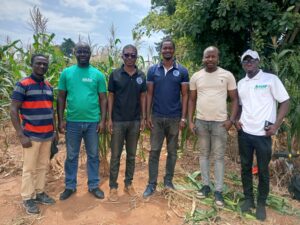
Mr Jerry Fenteng Asamoah (Mycologist)
Since 2016, the invasion of the fall armyworm (FAW) has plagued Ghanaian maize farmers, causing significant destruction during the germination and maturity stages of maize production. In response, the country initially resorted to using synthetic insecticides to combat the rapid spread of these pests.
“Although synthetic insecticides have been immensely valuable in the fight against the pest, their continuous use is unsustainable,” says Dr. Kofi Frimpong Anin, an entomologist at the Crop Research Institute (CRI) in Fumesua.
The detrimental impact of FAW on maize producers and the nation as a whole prompted scientists at CRI in the Ashanti region to devise a more sustainable strategy.
In 2019, a team of CRI scientists, with funding support from the Korea-Africa Food and Agriculture Cooperation Initiative (KAFACI), began exploring the use of biological agents to combat FAW.
This initiative led to the development of sustainable FAW management practices based on native biological agents, including parasitoids, entomopathogenic fungi (EPF), and entomopathogenic nematodes (EPN).
These agents, identified at various locations in Ghana, have been evaluated both in the laboratory and in the field, demonstrating effectiveness comparable to that of common synthetic insecticides used against FAW.
The team established demonstration sites in three districts of the Ashanti region to introduce these technologies to farmers and educate them on the potential of relying on biological agents while reducing the excessive application of synthetic insecticides.
The current demonstration focuses on how EPF and EPN can be used to control heavily infested FAW in maize.
The maize was intentionally allowed to be heavily infested with FAW before being treated with EPF and EPN. Emamectin benzoate (Attack), a synthetic insecticide, was used as a positive control for comparison, along with another control where no insecticide was applied.
The FAW management technique being promoted under the mantra “using nature to tame nature” involves augmenting Telenomus parasitoids on young maize, followed by the application of either EPF or EPN. This demonstration was carried out in collaboration with the Department of Agriculture in Sekyere Central District and selected maize farmers from the district, with funding provided by KAFACI.
The Way Forward
The EPF Beauveria bassiana, a potent bioagent used as a biopesticide in many countries, has shown great potential. The native Beauveria bassiana in Ghana is particularly potent and has the potential to be commercialized as a biopesticide. CRI is seeking partnerships with private investors to produce and package it as a bio-insecticide for commercial sales.
This project intervention was led by 3 team leaders
Dr Kofi Frimpong Anin (Entomologist)
Dr Yaw Danso (Nematologist)
Mr Jerry Fenteng Asamoah (Mycologist)
Dr. Blankson Amoabeng (Entomologist), Dr Ernestina Awarikabey (Entomologist), Mr Godfried Ohene-Mensah (Plant Pathologist)
The story was jointly written by Richmond Frimpong and Dr. Kofi Frimpong Anin, Entomologist at Crops Research Institute




